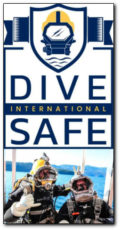Nova Scotia diving regulations ‘at the bottom’ in Canada
By CADC Admin ~ November 5th, 2015. Filed under: Latest Diving News, Safety, Standards and Regulations.
Gord Hay remembers Luke Seabrook as a “very keen” and eager student of commercial diving at the Canadian Working Divers Institute in 2010.
In Hay’s 23 years running the school in Chapleau, Ont., Seabrook is the first graduate to die on the job, and that angers Hay.
“This should never have happened,” said Hay, a member of the Canadian Association of Diving Contractors, a commercial diving industry group. He believes Nova Scotia’s occupational diving regulations may be partly to blame for Seabrook’s death.
Seabrook, 39, died while doing an underwater inspection of a dam gate at the Nova Scotia Power Tidal Plant in July.
Nova Scotia lags behind
“Nova Scotia’s diving regulations right now are at the bottom in Canada. We’ve been pushing Nova Scotia ministry of labour to come up to CSA [Canadian Standards Association] standards as a minimum, and this probably wouldn’t have happened if they had,” said Hay.
Newfoundland, P.E.I., Alberta and Manitoba require diving contractors to meet two CSA standards that deal with operational procedures and diver competency.
Hay says Nova Scotia’s diving regulations stipulate crews must be competent, but fall short in operational procedures. He points to minimum crew staffing levels as an area of concern.
Seabrook was doing what’s known as a Delta P dive. Delta P refers to differential pressure and a CADC document says “a high proportion of occupational diving fatalities occur because of divers encounters with differential pressures at dams and work sites.”
The 32 pages of guidelines outline safety procedures crews should take because “the investigations of these tragic incidents indicate that the majority of these encounters were preventable.” But the document isn’t law anywhere in Canada.
Another approach
As far as diving safety expert Steve Donovan is concerned, Ontario and British Columbia have set the standard by enacting the most comprehensive diving regulations in the country.
Donovan was a member of regulatory working groups in both Ontario and Nova Scotia. He likes the Ontario and B.C. requirements that contractors file the date, time, and location of their diving operations with labour department officials.
The diving plan must be given with at least 24-hours’ notice. Ontario goes further, demanding a list of details such as the maximum dive depth, the divers’ tasks, and statements about whether the job is offshore or onshore.

Seabrook had just gotten married three months before the diving accident that claimed his life. (Submitted by the family of Luke Seabrook)
Donovan wanted Nova Scotia to adopt similar regulations, but he ended up walking away from the regulatory working group around 1996, and feeling much more could’ve been done.
“Nova Scotia regulations were watered down to meet the request of the majority of the working group. I was at odds with a number of people in the working group because they didn’t want to see those controls, stringent regulations,” he said.
“They thought a B.C. approach, an Ontario approach, was too much.”
Inspections are crucial
But neither industry guidelines nor provincial laws are effective if diving contractors don’t think they’re being watched, according to the CEO of the Diver Certification Board of Canada. David Parkes says the probability of enforcement by labour inspectors leads to compliance of rules.
“Any regulation is as strong or as weak as its enforcement. So you can have the best regulations in the world but if you don’t enforce them they’re useless,” said Parkes.
“The beauty of that is they don’t know if an inspector’s going to come and visit the dive site or not. But they do know that the inspector knows that the dive is happening.
“It’s kind of like having Mounties on the road so we won’t speed. It’s the same thing. If you think there’s an inspector coming to your site, you’ll have everything going perfectly.”
As of Monday, Ontario had been informed of 501 commercial diving operations this year. A Nova Scotia department of labour spokesperson was unable to estimate how many jobs were in the province because notification is not required.
Gord Hay has taught more than 500 students, many of whom now work in Nova Scotia. He hopes the safety environment for all divers in Nova Scotia is improved.
“Hopefully there’s some changes in your province because of this because it really needs it,” said Hay.







